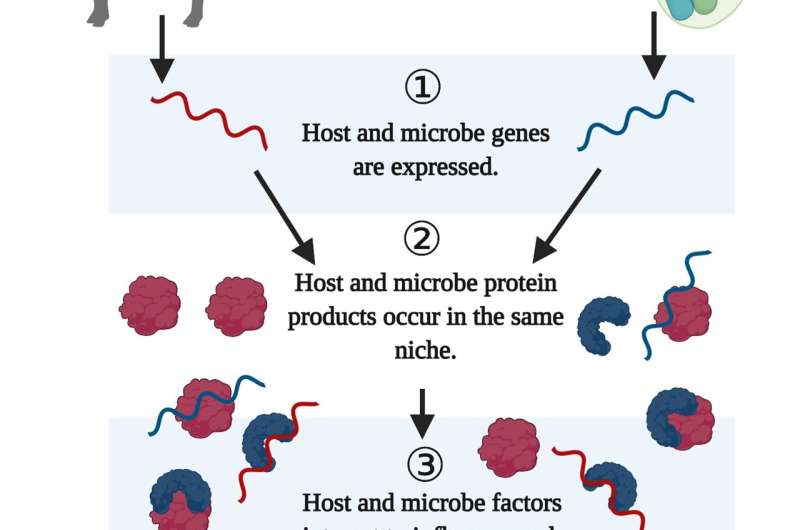Darwin's magnificent mystery and the microbiome

Vanderbilt researchers are reimagining Charles Darwin's work by communicating how the origin of species might depend largely on the microbiome—the totality of bacteria, viruses, fungi and other organisms—living in or on a host body.
Darwin's On the Origin of Species put forth a seminal and revolutionary thesis for the life sciences in 1859: Populations with a common ancestor evolve over time with enough change to become different species that no longer successfully interbreed. This process of descent with modification continues over time to produce lineages of new species. Darwin famously referred to the process of one species becoming two as "the mystery of mysteries."
More than 160 years later, the life sciences are experiencing a second revolution based on the newly appreciated knowledge that all plant and animal species are stable or temporary hosts to a microbiome living in or on the body.
An essay and literature review first authored by SyBBURE scholar and biological sciences undergraduate Asia Miller and co-authored by Seth Bordenstein, Centennial Chair in Biological Sciences, professor of biological sciences and director of the Vanderbilt Microbiome Initiative, imagines how some chapters in Darwin's Origin of Species would look with our current understanding of the host-associated microbiome.
The article includes examples of how the microbiome of a hybrid—the offspring of two species—can be different and potentially harmful from that of its two parental species. "The microbiome field is relatively new but already full of research and ideas. Through this work, we are emphasizing the diverse roles of microorganisms in animal biology and that not every microbiome is a fit for every host," said Miller, who is also president and founder of the Vanderbilt University Microbiome Society.
This work highlights how the evidence for microbiomes as agents of host speciation has essentially reached a tipping point for microbiologists, evolutionary biologists, chemists, immunologists and developmental biologists. It sets the stage for a more integrative phase of study, funding and meetings focused on host-microbe interactions shaping the origin of species.
"We compiled a rich summary of evidence that shows hybrids generated between different, closely related animal species—including mites, flies, wasps, fish, mice, deer and horses—have microbiomes that are different from their parentals. We showed that some of the hybrids suffer or even die because of these altered microbiomes, adding cumulative weight to the evidence that host-associated microbiomes should no longer be overlooked as components to understanding the origin of species," Miller said.
Miller and co-author and NSF Postdoctoral Scholar Karissa Cross will be investigating the microbiome of Nasonia, a genus of parasitoid wasps. Some hybrid Nasonia do not survive because of how different their microbiomes are from their parents."
In the long term, the researchers would like to see this inflection point in the discipline contribute to increased research engagement on the microbiome and its effects on speciation, which Darwin viewed as grandeur, most beautiful and most wonderful, Miller said.
The essay "The Role of the Microbiome in Host Hybridization and Speciation" was published in the journal PLOS Biology on Oct.26.
More information: Asia K. Miller et al, The microbiome impacts host hybridization and speciation, PLOS Biology (2021). DOI: 10.1371/journal.pbio.3001417
Journal information: PLoS Biology
Provided by Vanderbilt University





















